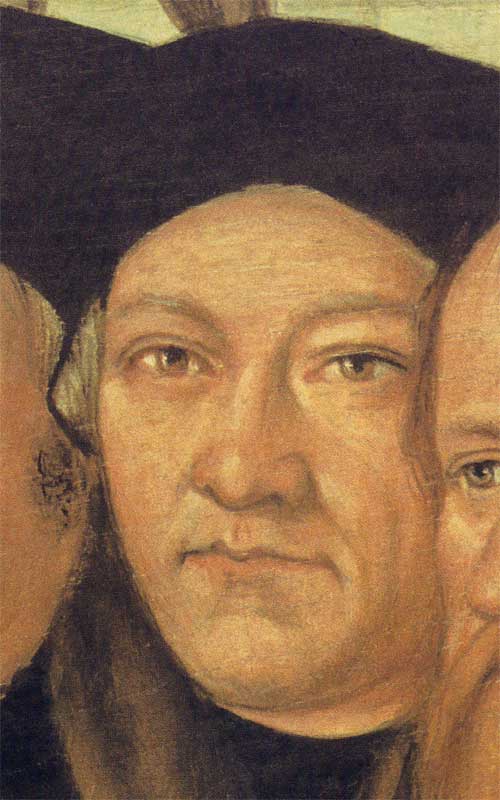A humanist and canon lawyer at the outset of the Reformation, Justus Jonas became a trusted confidant of the Wittenberg reformers and stood alongside them at some of the more significant events of the period. Born as Jodocus Koch on June 5, 1493 in Nordhausen, a free imperial city, his father was a senator in his hometown. By 1506, the precocious young Jonas had enrolled at Erfurt. He received his bachelor of arts in 1507 and his master of arts in 1510. While in Erfurt, he came under the sway of the humanism rapidly sweeping through northern Europe, even joining a small circle of humanists there.
Jonas left Erfurt in 1510 for Wittenberg, partly because riots in the town had broken up his humanist sodality and partly out of a desire to study with the noted Wittenberg jurist, Henning Göde. Shortly thereafter Jonas took a bachelor’s degree in civil and canon law before returning to Erfurt in the spring of 1515. The following year he began to preach and eventually was named canon of St. Severi in Erfurt. By 1519, he had received his doctor’s degree in civil and canon law from Erfurt, where he was also teaching at the time. Later that year, Frederick the Wise requested that Jonas take a diplomatic mission to the Netherlands to meet Erasmus of Rotterdam in Antwerp. Erasmus had proven influential on Jonas’s interest in humanist letters and he obliged. While away on the mission, however, Erfurt named Jonas its new rector. This gave him the opportunity to reform the curriculum by extirpating the traditional scholastic remnants in favor of humanist alternatives.
Jonas’s early relationship with Luther and the Wittenberg reformers came largely through proxy. He had befriended John Lange, a Greek scholar at Luther’s old Augustinian house in Erfurt and himself a friend to Luther. Through Lange the Jonas and Luther exchanged correspondence, and Jonas later took sides with Luther after the Leipzig Debate, publishing a tract that defended him against John Eck’s charges. He would then accompany Luther to the Diet of Worms in April 1521, along with Jerome Schurf and Nicholas von Amsdorf. As a result of his association with Luther at Worms, he was deposed as canon at St. Severi in Erfurt and excommunicated. His own hero, Erasmus, attacked him for supporting Luther’s more contentious approach to reform.
This series of events led to Jonas joining Luther in Wittenberg. Göde had died in early 1521 and Wittenberg needed someone to replace him. It called Jonas to serve as both professor of canon law and provost of All Saints’ in Wittenberg. He was far more interested in biblical study than law by this time and he personally compensated someone else to teach canon law so he could focus on teaching in the theology faculty. He was conferred his doctor’s degree in theology in October 1521 and primarily lectured on Scripture the remainder of his tenure. In 1523, Jonas was selected dean of the faculty at the university, a position he would hold until 1535.
His enrollment into the Reformation cause occurred at roughly the same time as his call to Wittenberg. In 1522, he renounced celibacy and was married. He served the Reformation in various capacities during the succeeding years. He translated many of the Latin writings of Luther and Melanchthon into German so they could be read by the general populace. He participated in the visitations of Saxony that ran intermittently from 1526 to 1528. He also joined the Wittenberg contingent at both the 1529 Marburg Colloquy and the 1530 Diet of Augsburg.
Jonas’s contributions during the later years of the Reformation involved his administration of church life in newly reformed lands. He aided in reforms at Anhalt in 1532, Naumburg in 1536, and ducal Saxony in 1539, helping to draft a church order for the latter. He also drew up a church order for Zerbs in 1538. It was in Halle, though, that he placed his more immediate thumbprint on the church. He had arrived in Halle in 1541, at the request of citizens and with blessing of Luther, to stabilize the reforms that had begun in 1536. He drafted a church order for them in 1543 and became superintendent there in 1544 before the ongoing Schmalkaldic War forced him to flee Halle twice. During one such exile, he became superintendent at Hildesheim for nine months. When he did return to Halle a second time in 1547, the town council prohibited him from preaching. He finally left to become superintendent at Coburg in 1550, then was called to the church in Regensburg in 1552 before finally going on to Eisfeld as minister and superintendent until his death.
Personal tragedy occasioned much of this later period in Jonas’s life. In 1542, one of his sons drowned in the Saale River. Later that year, his wife died giving birth to their thirteenth child. He remarried a year later, but his second wife died in 1549. He married a third time in 1550 before leaving Halle for Coburg. He also witnessed the passing of his good friend Luther in 1546. Luther was on the way to mediate a dispute in Eisleben, and Jonas joined him for the journey beginning in Halle. He recorded the account of Luther’s death and final words at Eisleben, as well as his later funeral. Jonas himself died in Eisfeld on October 6, 1555.
